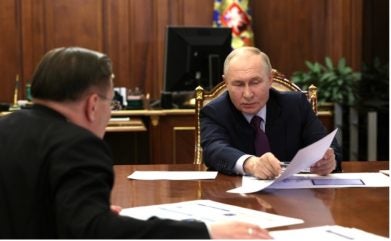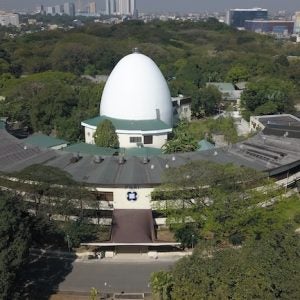
In a lengthy meeting with Russian President Vladimir Putin, Rosatom Director General Alexey Likhachev said that, despite external challenges, Rosatom had managed to maintain serious development parameters. “We not only strengthened our projects, but also laid serious groundwork for the future, primarily in terms of scientific and technological development,” he said.
On economics, Likhachev said average annual revenue growth is 24% and the target for 2024 is RUB3,000bn ($31bn) of which RUB1,200bn is revenue from new products. The average annual increase in foreign revenue is 23%. Rosatom now employs 400,000 people and labour productivity is targeted at 12% a year while wages have increased 11% over the past five years. Orders already concluded for the next 10 years total RUB 52,000bn. However, Likhachev said he expected this to increase possibly to RUB100,000bn
He stressed the important role of the defence order in Rosatom’s work. He noted that the nuclear weapons complex “is a supplier of sovereign technologies in all our advanced areas: mechanical engineering, the digital economy, medicine, additive manufacturing, and materials science”. He added: “This allows us to achieve rapid growth in the volume of civilian products. Already last year we achieved 50%.” In addition, state defence order is increasing “sometimes growing tenfold”.
Likhachev said the goal of achieving a 25%chare for nuclear in electricity production is being fulfilled. The cost of electricity is low “We have a very high installed capacity utilisation rate – more than 80%, and, of course, we are import-independent, so all the challenges associated with import substitution did not result in economic damage to our projects.” Because of Rosatom’s low tariff, “the Ministry of Energy supports our proposal for 37 power units by 2042, this will allow us to reach 25% in the mid-40s”. Currently nuclear account sof around 19% but if Rosatom’s wind farms are included this increases to 20%.
As to foreign construction projects, these are going very well. Likhachev thanked Putin “for the decision made many years ago on nuclear export support tools” He said: “This is a very effective tool – lending to the customer country. Firstly, the money is returned to us with interest, and secondly, it is actually used in the Russian Federation. And, of course, we create projects that will last hundreds of years in these countries in the truest sense of the word. This export support tool works very well.”
Likhachev added that Rosatom also supplies fuel to countries with reactors of foreign design. “In the United Arab Emirates the Koreans built a station and they are buying our enriched uranium product, POU (Postavlyaem Obogashionnii Uranovii). In Brazil, in Mexico we supply enriched uranium product, although they have stations of American design.
The Great Northern Sea Route is supporting the entire transport infrastructure in the north, “solving the problem, first of all, of course, of exporting our goods, and secondly the connectivity of territories, including northern delivery, and, of course, also the task of international transit”. Likhachev said nuclear icebreakers are being constructed according to plan. “However, the big challenge is the construction of the Arctic cargo fleet, which we reported separately to the Government, and it will also be in the federal project.” He noted: “Despite all the pressure, we have a very large demand for the Northern Sea Route precisely in terms of the transportation of goods.”
He added: “Of course, we work in a coordinated manner, including with our transporters, railway workers, and our task is to ensure logistic sovereignty, while developing container transportation in a special way with our foreign partners. The People’s Republic of China, India… show interest and a joint venture has been created with the United Arab Emirates.”
On future technologies, Likhachev recalled that a year ago the talk was about a 16-quantum processor. “Now there are already 50. And from being behind, we are now among the top five countries. “In general, all four platforms are developed by only two countries: us and the USA.” Work is now underway to create super-power computing platforms both in terms of today’s supercomputers and “work in the photonic direction”. He added: “In general, here, not only due to the multiplication of computing power, but also due to new physical principles, we, of course, will solve this problem – the creation of computing superpower.”
As to progress in materials science, Likhachev noted: “Now we are able to manually create new materials with specified properties. Our task is to do this in the next generation, using artificial intelligence, on a huge industrial scale. Let’s try to make this leap within a year and offer specific installations along with artificial intelligence.”
Other areas discussed included nuclear medicine, nuclear technology in space, the development and improvement of Rosatom’s 31 nuclear cities as well as training of new generations of nuclear scientists.
In conclusion, Likhachev noted that in 2025 there will be a holiday celebrating 80 years of the nuclear industry. “We would really like this to become a holiday not only for nuclear scientists but for the whole country and for all our foreign partners. With your permission, we will prepare such a programme and launch it this year.”
Putin agreed supported the proposal and agreed to attend. He commented: “Eighty years old, but the future is good, and this is also supported by the fact that, in my opinion, somewhere around 30% of nuclear industry employees are fairly young people.”






